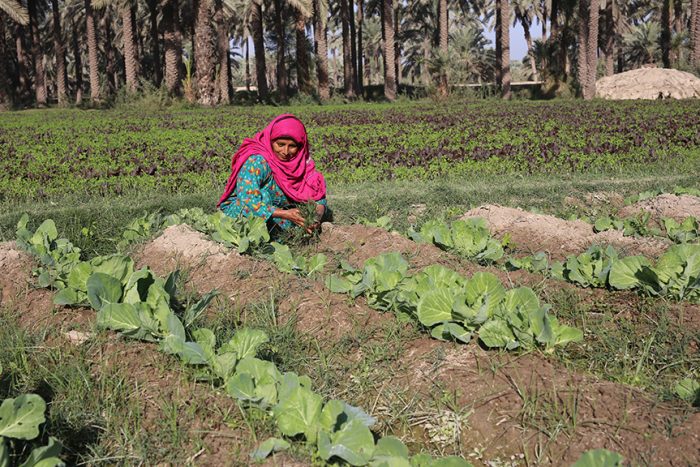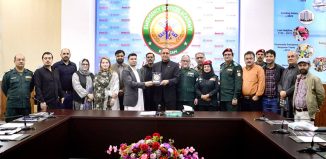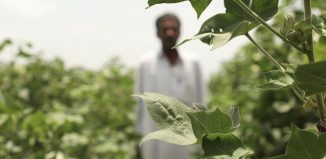Imamzadi: Equanimity in Adversity
Imamzadi and her husband Irshad Ali of village Bakshan Metlo, about 17 kilometres west of Khairpur city, own one acre of land and work another acre for a landlord. The harvest of the latter is shared on a fifty-fifty basis between them and the owner. However, the system is inequitable because if a calamity occurs and the crops are lost, the landlord does not share the loss. That is what happened in the great deluge of 2022.
They have only two children, a son and a daughter. In a milieu where a dozen or more children are taken as security for old age, Imamzadi says they had two because they thought it would be easier to feed and educate them. She recognises the reality that more working hands also mean a greater number of mouths to feed and it squares out in the end. Also, when they grow up, sons and daughters are of no help because they have their own families to feed and the same poverty to struggle against. “Two children are better,” she says.
In December 2024, she was a happy woman, because for the first time in her life, she was only under a loan of about PKR 20,000 (approx. USD 70.75), and her fresh young wheat and vegetable patch were looking good. She could not say ‘CWSA’ but used the word idaro (organisation) and it is because of this idaro that she was burdened only so lightly.
She explains that every sowing season, they hire a tractor to plough and obtain seeds on loan on the understanding that the creditor will be repaid after the harvest. In between if they ever need insecticides, those too are on credit. They never used fertiliser only because they could not afford it even if doing without it meant harvesting just about 600 kilograms of wheat per acre.
Back in 2022, after she and Irshad had harvested their wheat and paid off their loan, they prepared their land for sorghum and things looked good when it began to sprout. As the first rains began in July that year, the couple rejoiced, for the timing was perfect. But it rained and rained and rained endlessly and soon their young sorghum was under a metre of water. Four weeks of non stop rain wiped out everything they had on their meagre two acres. Without a harvest, Imamzadi and Irshad Ali fell into a debt of PKR 50,000 (approx. USD 176.87).
For a whole year, the couple kept body and soul together working as labourers where needed. In fact, Irshad Ali spent most of his time in nearby towns and even in Khairpur city where he worked on construction sites where he used to earn a daily wage of PKR 500 (approx. USD 1.8) . If they had lost their crops in the floods, others were deprived of the roofs above their heads and there was frantic rebuilding activity where Irshad was able to lend a hand for a few hundred rupees a day.
“If he got work in the city, Irshad would return with some flour and vegetables and a little cash. Then we would eat, but even so, that was not like before. There was very little food for a whole year,” says Imamzadi. As for herself, she earned around PKR 250 (approx. USD 0.9) by cutting 40kg of grass and selling it for fodder. If rainwater had killed off crops, at least it produced this abundance of grasses.
There was no wheat sowing in November 2022 because of waterlogging. The sorghum harvest in the summer of 2023 provided the family just about enough to sell for cash and keep some for food. But later that year, a project supported by Catholic Agency for Overseas Development (CAFOD) and Community World Service Asia (CWSA), brought its first round of farming input for Imamzadi’s family, among others affected by the floods of 2022. There was cash to pay for the tractor to plough and ample seed for the two-acre spread together with fertiliser. The wheat harvest in April 2024 yielded some 1,200 kilograms of wheat per acre.
Imamzadi says this was the first time they had used fertiliser which gave them the bumper crop. After settling with the landlord and selling some of their harvests for cash, they had enough grain to last them through the year. Very judiciously, the couple had also kept aside enough grain to be used as seed for the sowing in November 2024.
With an equanimity that comes from a life of hardship, Imamzadi recounts the only setback of 2024. The family owns 12 date palms, the fruit of which they sometimes process to make chhuvara, the cooked version of date. This past summer the couple had planned not to sell their standing crop for a lower price but to process and sell for better profit. As it was, the harvest had been stunted because of the past year’s waterlogging and just when the prepared fruit was drying in the sun, a short spell of rain damaged it. They could sell it only for half the usual price, about PKR 1,200 (approx. USD 4.24) per 40 kilogram.
When quizzed on how she looks at this loss, Imamzadi says, “What is life without its ups and downs?” And it is not as bad as it might seem for they did not have to invest any money in their date trees and they nevertheless made a profit on the chhuvara. “Next year perhaps there will be a better harvest,” she adds thoughtfully.
However, with the sprouted wheat looking good, Imamzadi had a whole acre of vegetables from seed provided under the project. “This is the first time we have no loan to clear when we harvest our vegetables and wheat. And with our own vegetables doing so well, our food is so much better than ever before,” says a very satisfied Imamzadi.







